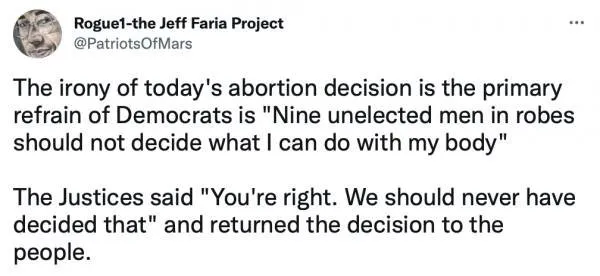
Wouldn’t it be great—in a way—if when New York, California, and Illinois keep abortion legal, all the progs moved to those states and then seceded? They’d probably even be pissed that we didn’t start a war to keep them in the union or really make even the slightest gesture to get them to stay.
The secondary benefit of the high court’s decision to overturn the ’73 decision that even RBG said was badly decided is that it will initiate a dazzling, country-wide demonstration of diversity (that’s a good thing, right, libs?) of opinion and phenomena from what Jefferson called ‘the laboratories of democracy’; our fifty states. We shall witness a fascinating multi-faceted experiment of social and political independence. This chaos will make clear the obscured truth that no two states are the same and that it’s best to let the people of a state decide for themselves instead of imposing some dictate upon them from some far distant capitol.
What works in Ohio may not work so well in neighboring Michigan but might work even better in Indiana. If all the states that try a particular solution have disasters, then all states quickly learn not to do what they did. We can learn to see the immutable in the mutable. The errors of government which are destructive can be more effectively rooted out this way, whereas it is far harder to discern the damage done by bad law when most or all states are suffering under it because there is nothing to compare it to. We don’t have the benefit of an example of a state trying it another way. Therefore, tragically, much of the harmful and destructive law tends to remain permanent when it is enacted at the federal level and imposed upon all states which effectively eliminates the control group that is so critical in legitimate science.
With the laboratories of democracy, the lessons of each state—for better or worse—can be learned, and states can more readily adapt as their people’s opinions evolve and new issues ensue. In this way real solutions emerge from the ground up, through ‘lived experience’ over the course of time. We are far more likely to cooperate with solutions agreed upon by people among whom we live (even if we disagree with the solution), and we are far more likely to be disgruntled with laws and regulations imposed upon us from afar by unaccountable, anonymous bureaucrats who haven’t the foggiest idea of how our state may be different from theirs.
At base, conservatism is the sentiment—almost an instinct—to protect and enhance our cherished inherited social order and the ‘permanent things’ on which our society is built. One of those permanent things is the belief in subsidiarity; that we should responsibly govern ourselves at the most local level possible in order for a just, stable and vigorous social order to emerge which best enables the most widespread flourishing of human happiness and prosperity.
People have a right to their laws, their customs, traditions, culture, norms, mores, and modes. True tolerance permits people to associate freely especially on the level of morality and the eternal questions. Americans are generally unified in trying to protect and preserve a cherished and settled-but-beleaguered and even besieged society that has been built upon the long and storied heritage of Western Civilization. But if we have to let go of California, New York and Illinois so that they can go build a Babylon, so be it. Please just don’t erect a Berlin Wall around your states and make it a crime for your people to flee to a pregnancy crisis center on our side of the border.